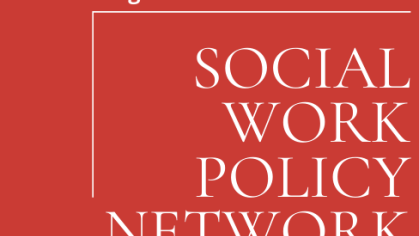By Francesca Baroni, as told to Shreya Gupta
Francesca Baroni is an MSW student at Rutgers School of Social Work and currently serves as Coordinator for Health Justice Initiatives at the Latino Action Network Foundation (LANF). Learn about her journey to a career in social work and her hopes for the future of the field.
What brought you to the field of social work and what made you want to pursue your MSW?
I was brought to the School of Social Work while obtaining my undergraduate degree at Rutgers. Initially, I had planned on majoring in psychology. However, upon discussing the social work major with another social work student, I began to appreciate the broadness of the field. I am glad that I switched majors as taking macro-level courses during my undergraduate education revealed my passion for policy-level work. Now, I am on the Management and Policy track as I pursue my MSW. While obtaining my MSW, I have also been pursuing the LISTA (Latino/a/x Initiatives for Service, Training, and Assessment) certificate. This certificate has allowed me to learn more about how to better serve the Latinx community, which, as a Latina, I am very passionate about. It has also provided me with many wonderful opportunities, such as being mentored by an experienced social worker, and an amazing field placement at the Latino Action Network Foundation (LANF). This field placement has allowed me to start doing the kind of policy advocacy work that I would like to do for the rest of my career.
Within the Rutgers SSW, I have also been able to participate in the Policy Fellows Program, which has allowed me to learn more about the roles that social workers can fulfill within a policy environment. This program has further enabled me to initiate my own social policy practice efforts within my field placement. I was also able to become a research assistant in October for faculty member Dr. Lenna Nepomnyaschy. Such an opportunity has been vital in allowing me to better understand the importance of research within the field of social work and familiarize myself with the topic of child and family well-being. I am incredibly grateful for the many activities and programs that I have been able to participate in within the Rutgers SSW. They have been instrumental to my professional development and the establishment of my career goals as a social worker.
I understand that you’ve been appointed as Coordinator for Health Justice Initiatives. Could you share a bit about how you got this role and what it will entail?
I started working with the Latino Action Network Foundation (LANF) at the end of August last year as my field placement. Through this placement, I have assisted in various policy advocacy and organizing efforts dedicated to the social and economic empowerment of Latinos in New Jersey. Within my field placement, I became involved in a variety of efforts including one to combat de facto segregation in New Jersey schools and redistricting efforts to enhance the political voice of the Latinx community and other marginalized communities.
At the end of the Fall 2021 semester, I was offered a position with LANF as their Coordinator for Health Justice Initiatives. Through this position, I will be working on a broad variety of initiatives, many in collaboration with coalition groups, to address health disparities within the Latinx community. Such work is especially pertinent as health disparities have been exacerbated through the COVID-19 pandemic. Through this position, some of my responsibilities will include coordinating LANF’s BIPOC mental health, and reproductive health and freedom efforts as well as efforts to assist various New Jersey Latino community-based organizations in service provision, in light of the pandemic. LANF is an amazing organization with goals and policy interests closely aligned to my own, so I am incredibly excited to grow within this role and organization and to familiarize myself with a new area of social policy.
What are your hopes for the field of social work?
I hope for a future generation of social workers interested in addressing social problems at the macro level. While clinical social work is very important and clinical social workers are very much needed, there is, unfortunately, a lack of social workers who seek to engage in macro-level work. Many of the social problems that we seek to ameliorate persist at a systemic level, as opposed to at the individual level. For this reason, it is important to also have social workers engaged in combatting systems of oppression. Further, we need individuals with social work backgrounds playing active roles in influencing the policies that impact oppressed and marginalized communities.
The social work field provides a unique perspective in that it considers micro, mezzo, and macro aspects, regardless of your level of practice, and is driven by a strong ethical code. We need more policymakers and advocates that are guided by such perspectives and values. Personally, when I began to contemplate pursuing the Management and Policy MSW specialization at the Rutgers SSW, I worried that there might not be a space for me when it comes to influencing policy or that I might not be qualified enough for my future career goals. That is not the case. I hope for a future generation of social workers that recognize that they are not just capable of fulfilling these roles but also needed within these roles.



